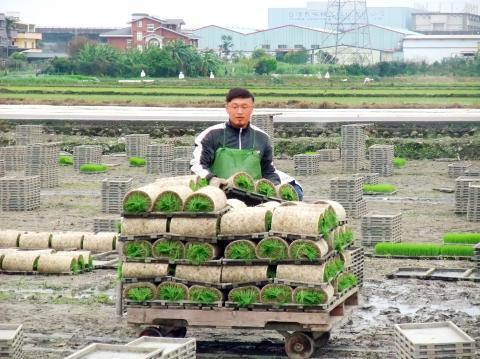After passing through the Hsuehshan Tunnel and driving down to the Lanyang Plain in Yilan, fields are filled not with stalks of grain, but signposts advertising land or farm sheds that are up for sale.
Despite the growing number of mansion-like houses that are going up on farmland and the area being something of a city dwellers’ back garden, Yilan is still home to a few people who are starting out in their farming careers.
Chen Chun-hao (陳君浩), 27, who hails from a family of farmers, said he was worried that “Yilan might not have any more farmland.”

Photo: Chung Li-hua, Taipei Times
Chen, who returned to his hometown after completing his military service, said that of the 200-plus elderly farmers who are registered with the Farmer’s Association, you could count on one hand the number who had young men to take over from them.
Despite generations of farmers preceding him, Chen has his own ideas about how to run things. The low price they get for rice, for example, is primarily the result of middlemen, and to change that, he has decided to sell the rice himself.
Chen also designed his own rice sacks. The next step is to find people who are willing to buy his rice.
He has also faced difficulties because he does not use the Internet to sell his products, as Internet shoppers like to compare prices, which would not help Chen realize his goal.
Chen tried going directly to stores. However, none of them wanted to sell rice that came directly from farmers, as the stock they had on their shelves came from wholesalers. He also tried direct marketing and, at the risk of being chased off by the police, he even tried selling his produce on the streets, with two pots of cooked rice for sampling.
Like Chen, the problem of production and sales has troubled 27-year-old Hsiung Kuo-chuan (熊國荃).
A farmer in Yilan’s Sansing Township (三星), Hsiung, who was born in Taipei, could only sell his produce to regular customers or at farmer’s markets.
Although Hsiung’s profits from the produce he sold himself were two to three times more than when he sold to wholesalers, he always worried about where he would find customers for the next harvest.
The youngest farmer in the town, Hsiung became interested in farming after helping out at a farm at the Chinese Culture University, where students tended small vegetable plots.
Though Hsiung’s vocational choice puzzled his parents, they were still willing to help him out when he needed it.
Of his two years in Yilan so far, Hsiung said that his confidence in agriculture had risen and fallen, but he had promised to give himself three to five years to see if it is possible for him to continue in his chosen vocation.
Hsieh Cheng-hung (謝政宏), a graduate of Fu Jen Catholic University’s Department of Life Sciences, didn’t share Hisung’s or Chen’s sales problems as he worked with production and sales students.
Freed from these concerns, Hsieh said he was planning to plant vegetables and fruit, which sell better than grains.
Hsieh said he had never thought that he would be a farmer and had only returned home to take up this line of work after he had difficulties finding a different job. Not content with the 0.3 hectares of farmland his family owned, Hsieh rented 10 hectares, stretching from Lotung (羅東) to Sanshing, and turned over all the planting to agricultural sub-contractors.
Now, Hsieh goes to “work” every day from 9am to 5pm, making rounds and inspecting his farmland.
However, life as a farmer is not all rosy.
Chen said two young men from Keelung who planned to get into farming heard his story and came to visit him, hoping to get some advice.
Chen said he spoke honestly about his experiences and told the men to think twice about becoming farmers, saying that “young people can give agricultural life a try, but it shouldn’t be treated as a vocation.”
“Without strong economic and technical support from your family, the road is a hard one to walk,” he said.

STAY AWAY: An official said people should avoid disturbing snakes, as most do not actively attack humans, but would react defensively if threatened Taitung County authorities yesterday urged the public to stay vigilant and avoid disturbing snakes in the wild, following five reported snakebite cases in the county so far this year. Taitung County Fire Department secretary Lin Chien-cheng (林建誠) said two of the cases were in Donghe Township (東河) and involved the Taiwan habus, one person was bit by a Chinese pit viper near the South Link Railway and the remaining two were caused by unidentified snakes. He advised residents near fields to be cautious of snakes hiding in shady indoor areas, especially when entering or leaving their homes at night. In case of a

A tropical disturbance off the southeastern coast of the Philippines might become the first typhoon of the western Pacific typhoon season, the Central Weather Administration (CWA) said. The system lacks a visible center and how it would develop is only likely to become clear on Sunday or Monday, the CWA said, adding that it was not yet possible to forecast the potential typhoon's effect on Taiwan. The American Meteorological Society defines a tropical disturbance as a system made up of showers and thunderstorms that lasts for at least 24 hours and does not have closed wind circulation.

ENERGY RESILIENCE: Although Alaska is open for investments, Taiwan is sourcing its gas from the Middle East, and the sea routes carry risks, Ho Cheng-hui said US government officials’ high-profile reception of a Taiwanese representative at the Alaska Sustainable Energy Conference indicated the emergence of an Indo-Pacific energy resilience alliance, an academic said. Presidential Office Secretary-General Pan Men-an (潘孟安) attended the conference in Alaska on Thursday last week at the invitation of the US government. Pan visited oil and gas facilities with senior US officials, including US Secretary of the Interior Doug Burgum, US Secretary of Energy Chris Wright, Alaska Governor Mike Dunleavy and US Senator Daniel Sullivan. Pan attending the conference on behalf of President William Lai (賴清德) shows a significant elevation in diplomatic representation,

Credit departments of farmers’ and fishers’ associations blocked a total of more than NT$180 million (US$6.01 million) from being lost to scams last year, National Police Agency (NPA) data showed. The Agricultural Finance Agency (AFA) said last week that staff of farmers’ and fishers’ associations’ credit departments are required to implement fraud prevention measures when they serve clients at the counter. They would ask clients about personal financial management activities whenever they suspect there might be a fraud situation, and would immediately report the incident to local authorities, which would send police officers to the site to help, it said. NPA data showed